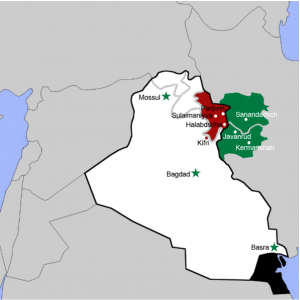These activities are Intermediate-Mid to Advanced-Low; however, Novice-level users will still be able to recognize familiar words and/or cultural references while reading, listening, speaking, and/or listening.
النشاط (قبل مشاهدة الفيلم)
المشاكل التقليدية والاجتماعية و الاقتصادية للولادة في البلدان المتقدمة و البلدان الغير مستقرة (يوجد تشابه بينها؟) ما هي؟

About the Author: Nura Al-Shibli

At the time of Aflaam’s creation, I was living in Raleigh, NC, volunteering with International Focus Inc. NC & Islamic Relief USA, and where destiny introduced me to the most dedicated Arabic instructor at Duke University, who we are all indebted to, Prof. Maha Houssami.
In choosing Arab Diaries, Episode 1: ‘Birth’, I was drawn by the real-life family and societal struggles depicted in a region faced with multiple issues, leaving the audience with the lingering thought: “Who is to blame?”
A variety of influencers: from strong patriarchal traditions, remnants of violent revolutions, authoritarianism, sanctions, foreign occupation, inequality, corruption, lack of basic services, and the war-machine constantly preoccupying the region by exacerbating these struggles, there are hardly any modern-day films that show the bright side of who we are and where we come from. (Note to future filmmakers: seize this opportunity)! Nonetheless, the audience will appreciate the diversity of the filmmakers / producers, the comparative case studies reflecting the mixed feelings: joys and worries, hopes and burdens, surrounding childbirth in the Middle East. Through this film, the audience will gain exposure to Iraqi and Levantine Arabic dialects. A multitude of dialects exist within a language, for instance: Iraqi northerners, southerners, rural and city folk each have a distinctive accent that could reveal one’s roots, or region, just from a few spoken words.
By now you have realized the connection with Iraq in particular. I was born in Washington DC, my family (from Baghdad’s Elwiya District) spent much of their lifetime outside of Iraq, but never lost touch with their homeland. The youngest of 3 siblings, I was considered the ‘lucky-one’, that is, American-born and not subject to the rigid tests one endures to become an American citizen. My early years were spent in Greenville, NC, then I later joined the US Army Reserve to pay for community college expenses. As a child, I was oblivious to what living in exile was like, until growing to understand the sacrifices and struggles faced by those who had no better alternative.
In 2003, the US-led war on Iraq began and my father returned to Baghdad with the Iraqi Reconstruction Development Council (IRDC) to help rebuild the country’s exhausted institutions. We later moved to Australia. Ironically, this is where my Arabic-language and cultural skills grew. Although from an Arabic-speaking household, I did not learn the language until my mid-20s, and encourage everyone of any age to learn a new language, or the language of your ancestors (including mathematics, also a language!) – all strengthen the mind and open possibilities. While taking basic Arabic language courses, I also completed a MA in Defense Studies from UNSW@ADFA, a BA in International Relations & Political Science from the ANU, and later became an Abshire-Inamori Leadership Fellow at Washington’s CSIS. My young adult years were spent following my father’s footsteps: I learned global diplomacy in New York, Iraq, Italy, and China.
My parents, mostly of Arab origin and from both Sunni and Shia sects, came from an Iraq that you hardly read of these days. A nation where Jews, Christians, Muslims, Arabs, Mandaeans, Kurds, Assyrians, Chaldeans, Turkoman, and all those in between, respectfully and harmoniously shared trades and traditions with each other, especially those from Baghdad. Iraqis all over the world embrace one another and share the civilization deep-rooted back to Mesopotamia, the heart of the world.